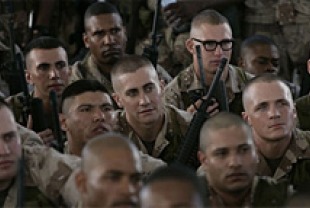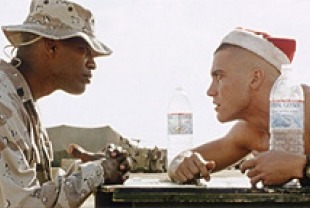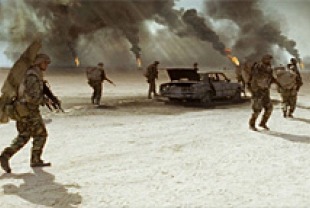Waiting is un-American. We want things right now, not later. Fast food, fast cars, fast sex, come on, let's get a move on! We assume that the only way to accomplish anything is to act decisively. Women can teach us about the fine art of waiting: they savor what this means in pregnancy. Children, at certain times and in some moods, live totally in the present moment. They are not concerned about what's coming next. But most of us are like the people on airplanes who leap out of their seats immediately after landing and try to push past everyone else to get out the door.
And waiting is not tolerated in war.
Young men have been trained to be killing machines, to act decisively and to follow orders. But what happens when the enemy is nowhere to be seen and the days stretch out into what seems like an eternity in the haze of nonaction? The setting for Jarhead is the Gulf War, specifically camps in Saudi Arabia where marines are waiting to be deployed to fight in Kuwait/Iraq. How do warriors handle waiting? Not very well, according to Anthony Swofford's 2003 memoir which has been adapted for the screen by William Broyles.
Swoff (Jake Gyllenhaal), trying to follow in the footsteps of his father who served in Vietnam, enlists in the marines. He is sent to a basic training camp where he undergoes the typical humiliation and brainwashing techniques used to make callow twenty-year olds into efficient killers. Swoff and his buddy Troy (Peter Sarsgaard) become scout snipers, which involves using high powered guns with great accuracy.
When they arrive in Saudi Arabia, they are primed for adventure and combat. Lieutenant Colonel Kazinski (Chris Cooper) turns these eager soldiers on with patriotic war whoops and images of "showing the enemy who's in charge." Swoff, Troy, and the other soldiers in the platoon report to Staff Sergeant Sykes (Jamie Foxx), who enjoys his life as a soldier.
But for the jarheads it soon becomes clear that they are not where the action is: instead they experience long, hot days of doing boring procedures, drinking lots of water, and pissing. It's no wonder that Swoff has a nightmare where he is throwing up sand.
To amuse themselves the men stage scorpion fights and create a Wall of Shame for all the girlfriends and wives who have betrayed them. The sexual rage of these men finds a regular outlet in masturbation. The most common expression of humiliation is to call another man a faggot. Swoff's impatience comes to the fore when he is demoted because of another Marine's incompetence. He takes his anger out on this poor fellow.
In perhaps the most grim scene in the film, a loudmouth soldier named Fowler (Evan Jones) takes the charred body of an Arab into a hole he has dug. Troy and Swoff intercede, and the corpse is dragged away. All of these scenes combined show the kind of rage and dehumanization that produced the travesties at Abu Ghraib and other prisons in the current war in Iraq.
Director Sam Mendes (American Beauty, Road to Perdition) has made an anti-war film that soft pedals politics and focuses instead on the jarheads and their frustration and impatience while waiting for an opportunity to engage the enemy. "Are we ever going to get to kill anyone?" is the question that these Marines struggle with every day.
In one of the most telling scenes, the jarheads gather to watch the anti-war film Apocalypse Now and roar with delight at a helicopter scene that shows Americans mowing down Vietnamese villagers with eager bloodlust. This becomes most ironic near the end of the film when Swoff and Troy are at last sent on a mission to snipe a top Iraqi officer. There they learn the shocking truth about the real nature of the Gulf War and their place in it.
Jarhead is inferior to David O. Russell's Three Kings and lacks the dramatic firepower of Apocalypse Now and Platoon. But in its own odd and low-key way, it does show the absurdity of war and the many ways in which Americans can be undone by their inability to wait.
Special DVD features include Feature Commentary with Director Sam Mendes, Feature Commentary with Screenwriter William Broyles, Jr. and Author Anthony Swofford, Swoff's Fantasies (with Optional Commentary by Director Sam Mendes and Editor Walter Murch), News Interviews in full (with Optional Commentary by Director Sam Mendes and Editor Walter Murch), and Deleted Scenes (with Optional Commentary by Director Sam Mendes and Editor Walter Murch).


